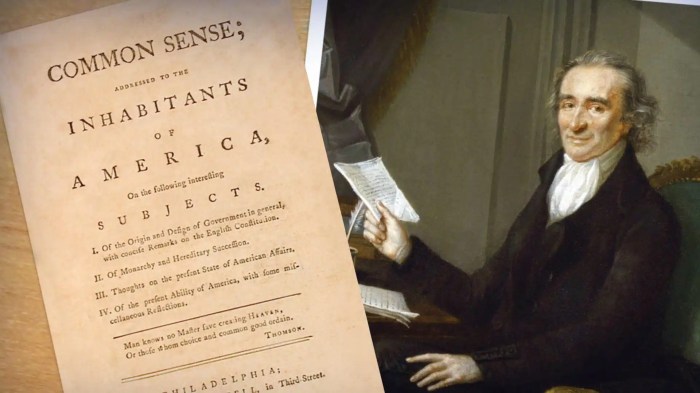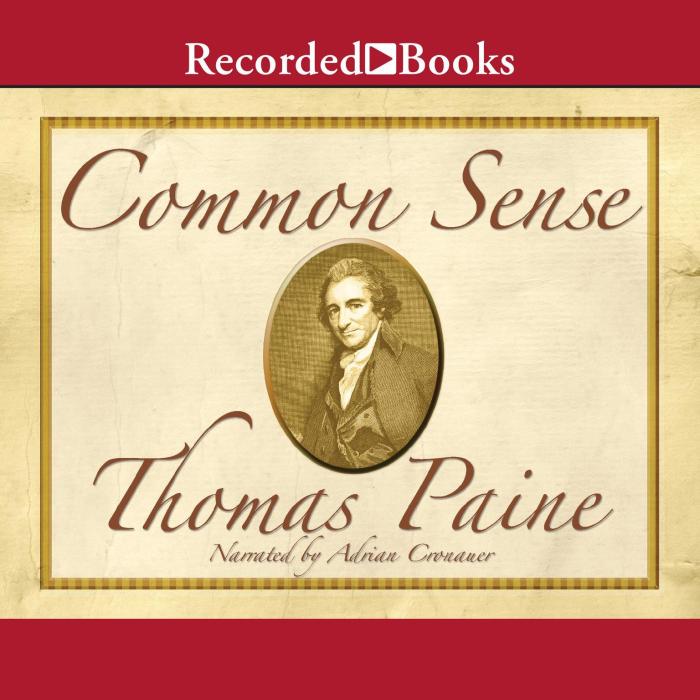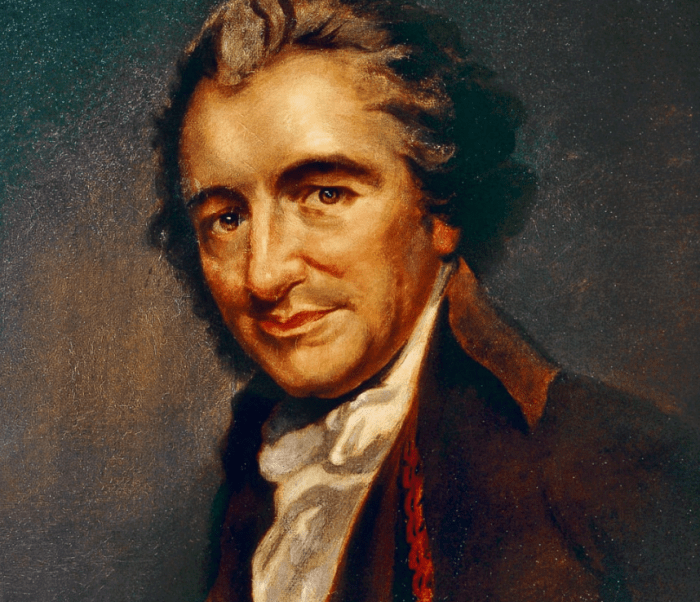Common sense thomas paine apush – Common Sense, a powerful pamphlet written by Thomas Paine, ignited the American Revolution and profoundly influenced the nation’s founding principles. Its persuasive arguments for independence, rooted in reason and common sense, galvanized the American public and inspired the Continental Army.
Paine’s eloquent prose and unwavering belief in natural rights and self-governance resonated deeply with colonists, shaping the course of American history.
Thomas Paine’s Life and Times

Thomas Paine, a renowned political activist, philosopher, and writer, played a pivotal role in the American Revolution and beyond. His writings, marked by their clarity, simplicity, and persuasive power, significantly influenced the course of history.
Early Life and Education
Paine was born in Thetford, England, in 1737. His early life was marked by poverty and limited formal education. Despite these challenges, Paine developed a keen interest in politics and philosophy through self-study and discussions with local intellectuals.
Involvement in the American Revolution
In 1774, Paine emigrated to the American colonies, where he quickly became involved in the growing revolutionary movement. His pamphlet “Common Sense,” published in 1776, was a resounding call for independence from British rule and became an instant bestseller. Paine’s powerful arguments, rooted in the principles of natural rights and popular sovereignty, inspired countless Americans to join the fight for independence.
Common Sense by Thomas Paine, a powerful pamphlet of the American Revolution, argued for independence from British rule. Its ideas resonate in a long walk to water chapter 1 , where Salva, a young boy in South Sudan, faces challenges with courage and resilience.
Paine’s call for common sense parallels Salva’s journey, highlighting the enduring power of human spirit in the face of adversity.
Political and Social Views
Paine was a staunch advocate for democracy, republicanism, and individual liberty. He believed in the inherent equality of all people and the importance of government based on the consent of the governed. Paine’s writings extended beyond political philosophy, delving into social and economic issues.
He advocated for the abolition of slavery, universal education, and a social safety net for the poor.
Common Sense: A Call for Independence: Common Sense Thomas Paine Apush

In 1776, Thomas Paine published “Common Sense,” a pamphlet that profoundly influenced the American Revolution. Paine’s powerful arguments for independence and his simple, direct prose resonated with the American public, galvanizing support for a break from British rule.
Main Arguments Presented in “Common Sense”
Paine’s pamphlet presented several compelling arguments for American independence, including:
- Natural Rights:Paine argued that all men are born with certain unalienable rights, such as the right to life, liberty, and property.
- Government by Consent:Paine asserted that governments derive their power from the consent of the governed, and that the British government had no legitimate authority over the American colonies.
- Separation of Church and State:Paine criticized the British government’s support for the Anglican Church, arguing that religion should be separate from the state.
- Independence as a Necessity:Paine maintained that the American colonies had outgrown British rule and that independence was necessary for their prosperity and freedom.
Impact on the American Public
“Common Sense” had a profound impact on the American public. Its simple, straightforward language and powerful arguments made it accessible to a wide audience. The pamphlet was widely read and discussed, and it helped to convince many Americans that independence was the right course of action.
Contributions to the Declaration of Independence
Paine’s ideas in “Common Sense” directly influenced the Declaration of Independence, which was drafted by Thomas Jefferson. The Declaration’s preamble echoes Paine’s arguments for natural rights and government by consent. Additionally, the Declaration’s language and structure bear a striking resemblance to “Common Sense.”
Paine’s Influence on the American Revolution

Thomas Paine’s powerful writings ignited the spirit of revolution among the American colonists, galvanizing them to fight for independence from British rule. His words resonated with the people, stirring their hearts and minds, and played a pivotal role in shaping the course of the American Revolution.
Paine’s Role in Rallying Support for Independence
Paine’s pamphlet “Common Sense” was a masterpiece of political persuasion. Written in clear and accessible language, it laid out a compelling case for American independence, arguing that the colonists had the natural right to self-governance and that the British government was a tyrannical oppressor.
The pamphlet became an instant bestseller, reaching a wide audience and sparking a wave of revolutionary fervor.
Paine’s writings helped to unite the colonists and convince them that they could achieve independence. He appealed to their sense of common sense and reason, arguing that the time had come for them to break free from British rule and establish their own nation.
Paine’s Inspiration for the Continental Army
Paine’s writings also played a significant role in inspiring the Continental Army. His words instilled a sense of confidence and determination in the soldiers, reminding them of the justness of their cause. Paine’s pamphlets were often read aloud to the troops, bolstering their morale and strengthening their resolve to fight for independence.
One of Paine’s most famous works, “The Crisis,” was written during the darkest days of the war. In it, Paine urged the soldiers to persevere, reminding them that “these are the times that try men’s souls.” His words helped to rally the troops and inspired them to continue fighting for the cause of independence.
Impact of Paine’s Ideas on the Outcome of the War
Paine’s ideas had a profound impact on the outcome of the American Revolution. His writings helped to shape the ideology of the revolution and provided a clear and compelling justification for independence. His words inspired the colonists to fight for their freedom and instilled in them the belief that they could achieve victory.
While it is impossible to say definitively whether the American Revolution would have succeeded without Paine’s writings, it is clear that his ideas played a significant role in the colonists’ decision to fight for independence and in their eventual victory.
Paine’s Legacy

Paine’s influence on American political thought extended beyond the American Revolution. His writings continued to shape the nation’s political discourse, and his ideas remain relevant to contemporary society.
Later Life and Writings, Common sense thomas paine apush
After the Revolution, Paine returned to Europe, where he became involved in the French Revolution. He supported the French Revolutionaries, but his criticism of the Reign of Terror led to his imprisonment. Paine was eventually released and returned to the United States, where he spent his final years.
Continued Influence
Paine’s ideas about democracy, natural rights, and the role of government continued to influence American political thought. His writings were widely read and discussed, and his ideas helped to shape the development of American political institutions.
Relevance to Contemporary Society
Paine’s ideas remain relevant to contemporary society. His emphasis on individual liberty, the importance of reason, and the need for a government that is responsive to the people are still fundamental principles of American democracy.
Expert Answers
What was the main argument of Common Sense?
Paine argued that the American colonies should declare independence from Great Britain, asserting that they had the natural right to self-governance and that British rule was oppressive and unjust.
How did Common Sense influence the American Revolution?
The pamphlet became a bestseller, reaching a wide audience and galvanizing support for independence. Its clear and persuasive arguments helped to shape public opinion and inspired the Continental Army.
What is Thomas Paine’s legacy?
Paine is remembered as a champion of liberty and democracy, and his writings continue to inspire movements for social justice and political reform.